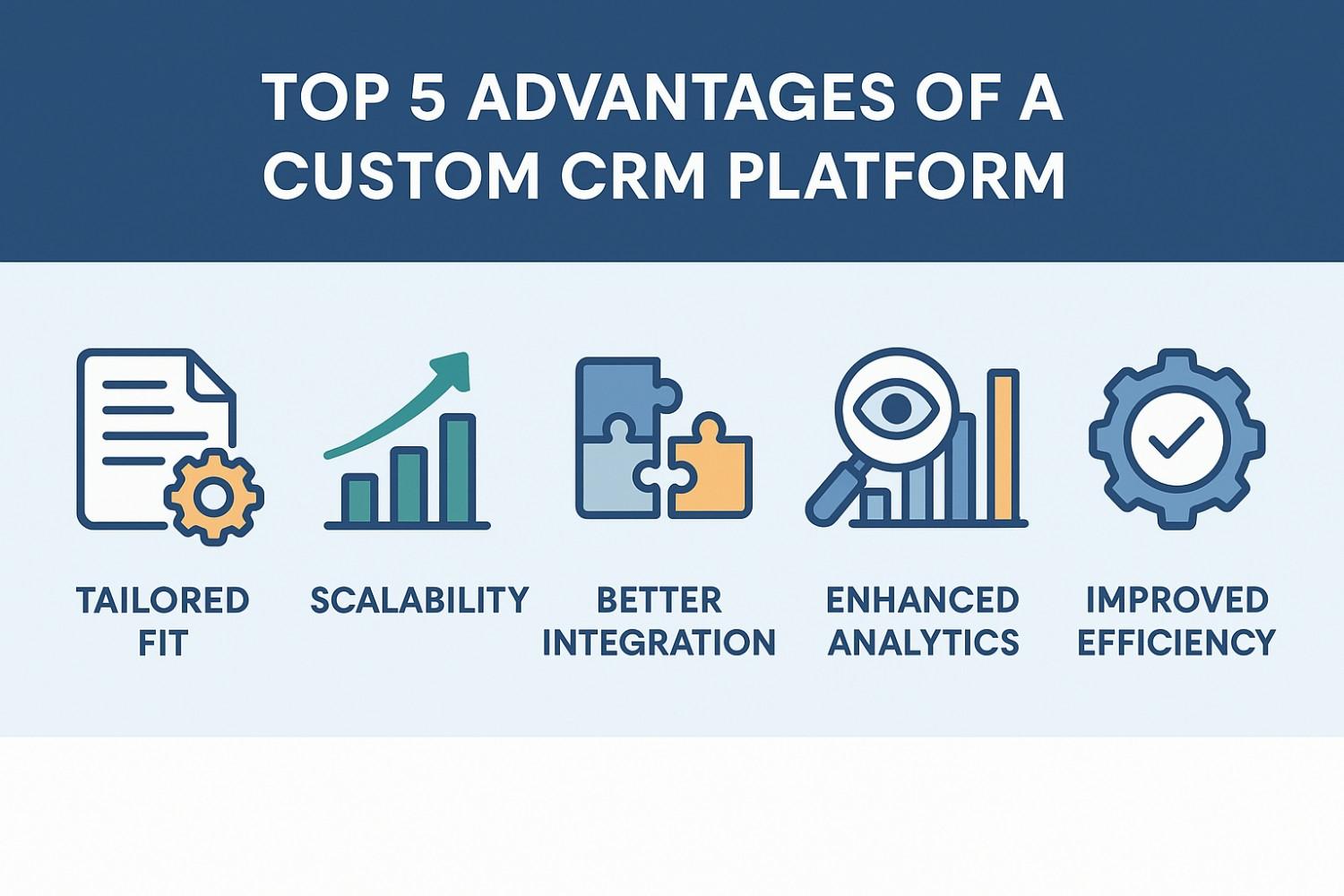Let’s start with the obvious: off-the-shelf CRM tools are like those one-size-fits-all t-shirts—technically wearable, but you either end up drowning in fabric or wondering if breathing is still optional. That’s where a custom CRM platform comes in. At Kanhasoft (yes, we’re that Custom CRM Software Development Company people keep mentioning), we’ve spent years watching businesses wrestle with generic solutions, only to later bask in the glory of a system built exclusively for them.
And honestly, there’s something satisfying about watching a business that once relied on spreadsheets suddenly say, “Wait, it can do that automatically?”
So, let’s break down the top five advantages of a custom CRM platform—with minimal jargon and maximum reality.
1. Tailored to Your Business (No, Really Tailored)
Picture this: you buy a pre-made CRM, spend weeks customizing settings, add a dozen plugins, and still end up emailing your team: “Ignore the third column on that dashboard—it lies.”
A custom CRM skips that nonsense entirely. It’s built around your workflows, not the imagined workflows of some Silicon Valley startup that thinks every company manages leads exactly the same way.
At Kanhasoft, we’ve seen clients who thought they had “unique” processes. Spoiler: they did. And we coded for them—without judging their 14-step approval chain (okay, maybe we judged a little, but quietly).
2. Scalability Without the “Surprise” Price Tag
Here’s a fun fact: most off-the-shelf CRMs love to play the “Oh, you hired two new sales reps? That’ll be $400 more a month” game.
A custom CRM platform doesn’t penalize you for growing. It’s designed to scale alongside your business—adding new users, modules, and features without forcing you to upgrade to a mysterious “enterprise plan” that costs as much as a small car.
We once worked with a client who started with 10 users and later expanded to 200. The system didn’t blink. (Neither did we, but only because we’d already budgeted for extra coffee during that expansion sprint.)
3. Better Integration—Because No One Likes Data Silos
If you’ve ever copied data from one app to another while muttering under your breath, congratulations—you’ve experienced “data silos.” They’re as fun as they sound.
A custom CRM platform integrates seamlessly with the tools you already use—your ERP, accounting software, marketing automation, and that obscure legacy tool your CFO swears by. The result? A single source of truth. No more duplicate entries. No more conflicting reports. Just clean, synchronized data.
We had a client who admitted their “CRM” was just a shared Excel file and a Slack channel. Let’s just say they now have dashboards so pretty, their finance team occasionally stares at them for fun.
4. Enhanced Security and Compliance (a.k.a. Sleep at Night)
We don’t need to tell you that customer data is sensitive (and that regulators love surprise audits). With a custom CRM, you control how your data is stored, accessed, and protected.
Off-the-shelf solutions can be secure—but they’re also designed for the masses, which means they might not meet your specific industry regulations or internal security policies.
When we build for clients in healthcare, finance, or even those with internal “we-don’t-trust-anyone” IT teams, we implement the exact compliance features they need—HIPAA, GDPR, or whatever acronym keeps them up at night.
5. Long-Term Cost Efficiency (Yes, Really)
We get it—custom development sounds expensive upfront. But here’s the math:
-
Off-the-shelf CRM: Monthly fees + paid add-ons + constant workarounds + lost productivity.
-
Custom CRM: One-time development cost + lower ongoing maintenance + no “extra” fees for the features you actually need.
One client told us their old subscription-based CRM cost more per year than their office coffee budget. (And trust us, they were a coffee-heavy team.) After switching to a custom solution, they saved enough to upgrade their actual office coffee. That’s ROI you can taste.
Quick Recap (for the Skimmers):
-
It’s built for you, not for “everyone.”
-
It scales without draining your budget.
-
It integrates so you stop manually copying data.
-
It locks down security the way you want.
-
It saves money over time—even if the upfront cost feels bigger.
Final Thoughts
Building a custom CRMplatform isn’t about vanity—it’s about control, scalability, and getting a system that works with you instead of against you. If you’re serious about growth, stop patching generic tools and start building something that actually fits.
At Kanhasoft, we’ve seen businesses transform simply by ditching cookie-cutter solutions. And yes, we’ve also seen them sleep better, work smarter, and maybe even argue less in team meetings.
Ready to see what a Custom CRM Software Development Company can do for you? Let’s just say: once you go custom, you don’t go back.
FAQs About Custom CRM Platforms
Q1: Is a custom CRM platform really better than a popular off-the-shelf tool?
Yes—if you value efficiency, control, and long-term savings. Off-the-shelf works for very small teams, but growing businesses benefit far more from a tailored solution.
Q2: How long does it take to build a custom CRM?
It depends on complexity. At Kanhasoft, projects typically range from a few weeks (for simple builds) to several months (for complex enterprise solutions).
Q3: Will a custom CRM integrate with my existing software stack?
Absolutely. One of the main advantages is that it can be designed to integrate with your current tools—rather than forcing you to change your entire system.
Q4: Is it secure?
Yes. A reputable custom CRM software development company (like Kanhasoft) will implement robust security protocols tailored to your industry.
Q5: What’s the cost difference between custom and off-the-shelf?
Off-the-shelf has a lower upfront cost but higher recurring fees. Custom solutions cost more initially but often save significantly in the long run.


